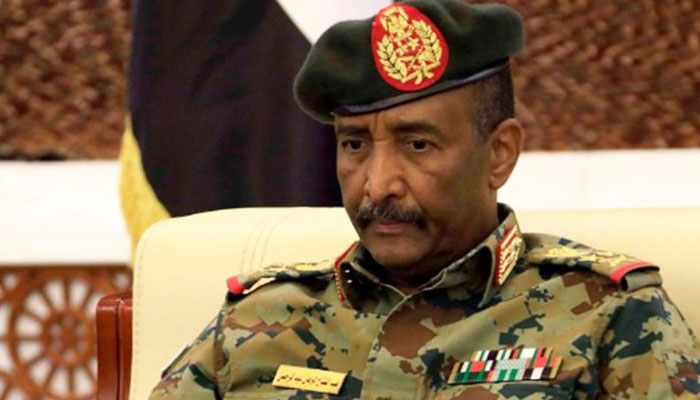Al-Burhan denies reaching political settlement with civilians

Chairman of the Transitional Sovereignty Council (TCB) General Abdul Fattah al-Burhan said on Sunday that the army “wants a consensus and a civil government to guard it,” denying the existence of a “bilateral political settlement” between the military and civilians, a day after Islamists staged protests for the second time in two weeks in front of the UN mission in Khartoum to reject international “intervention” aimed at reviving the democratic transition in the country.
Al-Burhan said during a speech he delivered at the “Al-Markhayat” military base in Omdurman, west of the capital, Khartoum, and broadcast on state television, “There is no bilateral political settlement… The army received a political paper and made its observations on it in order to preserve its strength, unity and dignity.”
“The army wants consensus and a civilian government guarded by it away from partisan quotas,” he said, apparently insisting on previous positions and ignoring Western pressure.
On Thursday, the “tripartite mechanism” announced the conclusion of “basic understandings” between the military and civilians, comprising the United Nations, the African Union and the Intergovernmental Authority on Development (IGAD)
On September 10th, the Bar Association’s steering committee submitted a draft transitional constitution to the “tripartite mechanism” that received broad domestic and international support.
The bill includes “the nature of the State, the rule of the Constitution, the rule of law, the document on fundamental rights and freedoms, the tasks of the transitional period, the federal system of government, and the structures and composition of the transitional authority”.
Al-Burhan repeatedly asserts that the army has nothing to do with the movements of the National Congress Party (NCP), to which the deposed President Omar al-Bashir belongs, and the Islamist movement. There have been reports of efforts to approach the army leaders with the aim of returning to political life from the gate of the military.
The Sudanese army is under great pressure from the Western powers, led by the United States, to form a civilian government. The military leaders insist on their positions and seek to counter these pressures by approaching international powers such as China and Russia.
“On April 11, 2019, the military leadership removed President Omar al-Bashir from the presidency (1989-2019) under pressure from popular protests that began in late 2018 to denounce the worsening economic situation.”
“Since 25 October 2012, the Sudan has been witnessing protests demanding full civilian rule and the removal of the military component from the transitional authority, and rejecting extraordinary measures imposed by al-Burhan, most notably the state of emergency and the dissolution of the Sovereign Councils and Transitional Ministers.”
Prior to Al-Burhan’s procedures, Sudan has been undergoing a transition since August 21, 2019, culminating in elections in early 2024, during which power is shared by the military, civilian forces and armed movements that signed a peace agreement with the government in 2020.












